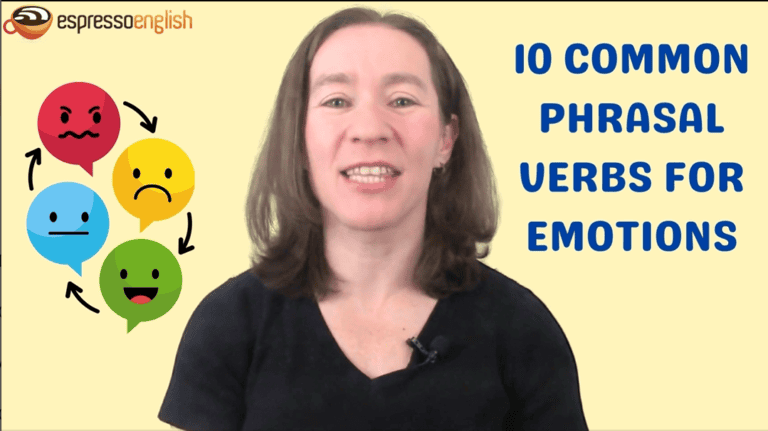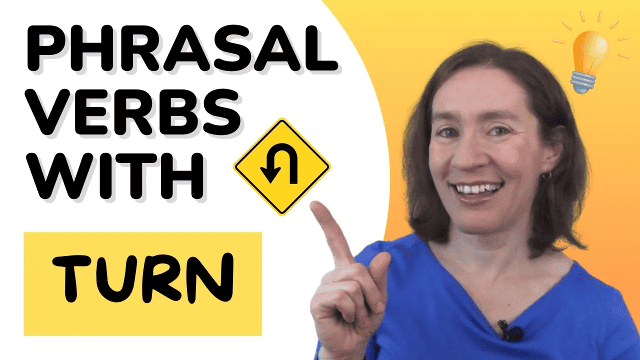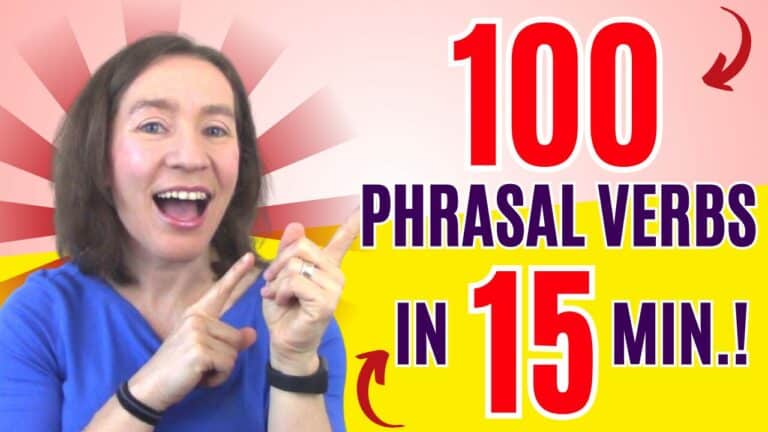
Learn more about the Phrasal Verbs Course
This lesson is on one of the topics that’s most requested by my students – it’s all about phrasal verbs with the word “get.” We have get off, get by, get along, get over, get back, and lots more… and some of these have multiple meanings!
These phrasal verbs are very common in everyday English, so you need to learn them. In today’s video you’ll learn 20 phrasal verbs with “get” – I’ll make them clear with definitions and examples.
But there are many, many more phrasal verbs in English, and you can learn over 500 of them inside my course called Phrasal Verbs in Conversation. That course will teach you phrasal verbs in the context of dialogues – it’s a fun and natural way to learn these common phrasal verbs. You can click on the link in the video or in the description to learn more and join that course.
Are you ready to learn about the different phrasal verbs with “get”? Let’s begin:
get across
Get across can mean to manage to go from one side to another, physically:
- It’s hard to get across the road when there’s lots of traffic.
It also has a meaning in communication: to get your point/message across means to communicate it successfully:
- The preacher used a powerful story to get his message across.
get along
To get along with someone means to have a good relationship with that person. If you don’t get along with someone, it means there’s conflict and irritation in the relationship.
- I get along with all my brothers and sisters.
- I don’t get along with one of my coworkers – he’s just so annoying.
get around
One meaning of get around is to manage to go places physically:
- The subway makes it easy to get around New York City.
- After she broke her leg, she used crutches to get around the house.
The expression get around to doing something means to finally manage to complete that task (often when we’re having difficulty because we’re so busy). We often use it in the negative form to say that he HAVEN’T had time to do the task yet:
- There are 56 emails in my inbox; I haven’t gotten around to replying to them yet.
get away
To get away means to escape.
- The dog got away from me at the park.
We can also use it for taking a short vacation from work, school, or other responsibilities of daily life:
- We’re hoping to get away to the mountains this weekend.
get away with
If you get away with something, it means you do something wrong or bad, but you escape the consequences:
- My mother never found out I stole money from her purse, so I got away with it.
get back
We use the phrasal verb get back as an informal way to say return – a person returning to a place, or an object being returned to its owner:
- The traffic was so bad, it took me an hour to get back home after work.
- Don’t lend him any books; you’ll never get them back.
get back at someone
The expression “get back at someone” is different – this means to get revenge.
- After Carly stole Sarah’s boyfriend, Sarah got back at her by spreading nasty rumors about her.
get back to / get back into
We also have get back to and get back into – these are used in slightly different ways. “Get back to” can mean returning to an activity after an interruption, or replying to someone’s communication:
- Sorry I can’t talk, I need to get back to studying for this test.
- I’ll find out the answer and get back to you tomorrow.
Get back into is used when you return to being interested in an activity after some time away from it:
- Now that I have more free time, I’m getting back into painting.
get behind
Get behind has two meanings – it can mean to fail to accompany an expected schedule:
- We’re supposed to read a chapter a day, but I’ve been sick so I got behind.
If you get behind a person or cause, it means you support that person or cause:
- The whole neighborhood got behind the proposal to build a new library.
get by
Get by is used when you have barely enough money to survive:
- We’re having a hard time getting by ever since my husband lost his job.
get down
Get down can mean to move down physically:
- She needed help to get down from the horse.
Another meaning is when something “gets you down,” meaning it makes you sad/depressed:
- Cold, dark winters always get me down.
get in
Get in can mean to manage to go inside:
- You can’t just enter the building, you need a key card to get in.
It’s also an informal way to say “arrive”:
- Our flight gets in at 11PM.
get into
Get into can mean to be accepted or admitted to a club, group, college, etc.:
- His grades were excellent and he got into a top university.
To get into an activity means to become interested/involved in it:
- My parents have been getting into gardening recently.
get off
Get off can mean to physically leave a bus, train, plane, bike, or motorcycle – or a surface:
- We got off the bus at the last stop.
- No matter how many times I clean it, I can’t get this stain off the floor.
It’s also an informal way to talk about leaving work:
- What time do you get off work?
- I usually get off around 5:30.
get on / get onto / get on with
We use get on / get onto for entering a bus, train, plane, bike, or motorcycle:
- He got on his motorcycle and rode away.
- Let’s make sure we get onto the right train.
The expression “get on with” an activity means to proceed with that activity, often after a delay or interruption:
- I told my kids to stop playing video games and get on with their chores.
get out
Get out can mean to physically leave a place, or remove something from a place:
- The weather was so bad, we couldn’t get out of the house.
- Can you get the bags out of the car?
If you tell someone “Get out!” it’s an angry way to tell them to leave, to go away from you.
We also have the expression “get out of doing something,” meaning to manage to escape a task or responsibility:
- My son pretended he was sick in order to get out of going to school.
get over
To “get over” something means to recover from it, physically or emotionally:
- I just got over a bad cold.
- It took her a long time to get over her dog’s death.
We also have the expression “I can’t get over…” meaning “I can’t believe…” or “I find it amazing”:
- I can’t get over how much she’s changed since the last time I saw her!
get through
The phrasal verb get through is used for proceeding with or finishing something difficult:
- I couldn’t get through the lesson; it was too hard.
- My friends helped me get through my first year at college.
get to
We can use “get to” as an informal way to say “arrive”:
- Call me when you get to Chicago.
Another meaning is to have the opportunity to do something good/special:
- At the circus, my kids got to eat as many snacks as they wanted.
If something “gets to” you, it means it annoys/irritates you:
- It was just a minor mistake – don’t let it get to you.
get up
You already know “get up” – it means to get out of bed! We can also use it for standing up after falling down:
- I always get up at 7:30.
- She had a hard time getting up after she slipped on the ice.
Learn more: 10 English phrasal verbs with COME
Now you know 20 different phrasal verbs with “get” – but what’s the best way to remember them all? Phrasal verbs are easier to remember when you put them into practice – so try to write your own sentences using the phrasal verbs from this lesson.
My Phrasal Verbs in Conversation Course includes lots of opportunities for you to practice. After each lesson in the course, there’s a quiz to help you review, and writing exercises to help you use the phrasal verbs you’ve learned.
Just click on the link below to register for my phrasal verbs in conversation course – I think you’ll really enjoy it. Thanks for watching, and I’ll talk to you next time!










